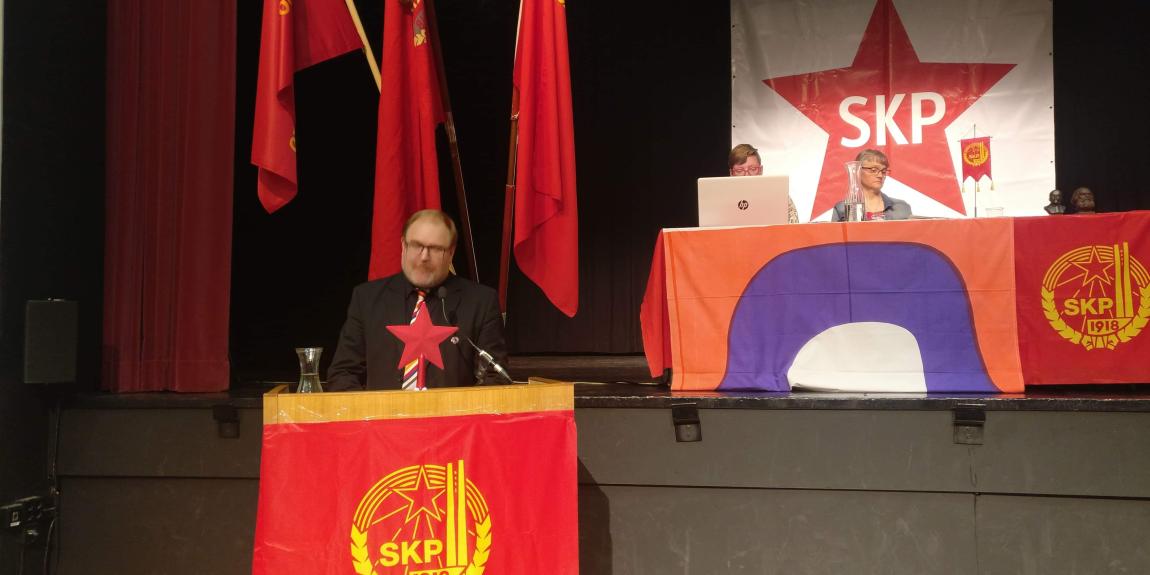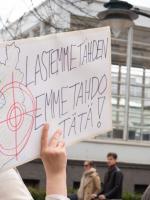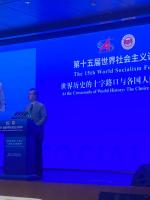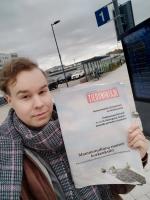Today is the moment - the right time and place for cooperation and progress
Today is the moment - the right time and place for cooperation and progress
Report presented to the Central Committee in the National Congress 2019
JP (Juha-Pekka) Väisänen - Chairperson of the Communist Party of Finland
The previous Congress was held on 4-5 June 2016 in Turku. Since then, significant changes have taken place in the world and in Finland during 2016-2019.
Congress,
Representatives,
International Guests,
Comrades,
Capitalism is in a new state. Now we need communist wit and the ability to bring the various progressive and democratic forces of change together into a radical leftist transformation - against capitalism, racism, fascism and the pushing down of the poor. Against scrapping workers' working conditions. Against war and militarization.
The Congress of the SKP assumes the role establish the initiatives. There is a radical time for left-wing cooperation and the break-up of capitalist politics, austerity politics and militarization. It is time for cooperation. The tome for policies for peace. It's time for me-too. Time for humanity.
There is a new situation in Finland. The dissatisfaction with the neo-liberal policies of the Juha Sipilä’s administration, the Center Party, the National Coalition Party and the True Finns all with neo-liberal program, allow the come into power of a semi-leftist coalition. Many things will certainly change from the past. However, Antti Rinne's government is in coalition with the Center Party of the previous administration, so much that the portfolio of the Minister of Finance of this left-wing government is on the hand of the neoliberal bourgeois.
The left-wing government's foreign policy lines remain attached to the pillars of EU “business freedom”. HX fighter acquisitions militarize the leftist programs. Is evident that, the direction of politics does not lean towards socialism and towards a radical left-wing economic policy, where we workers and our human needs have to be the first and foremost important issue, instead of the need of just a business oriented economy.
There is a need for a decisions and initiatives to change the direction of these policies that summarized the last parliamentary term. SKP Congress Documents and Initiatives look to the future, for participatory democracy, socialism, communism - the world without the exploitation of man and nature - to human-sized solidarity societies without wars and refugees - to the future we Communists want to see.
1 World events
1.1 General
World events also affect Finland. There have been significant events and developments;
Ukraine's problematic internal situation continues. It involves the increased confrontation between NATO and Russia and the sanctions imposed on Russia, in which Finland is involved.
Wars and unrest in the Middle East, the most notable being the Syrian war. Palestine's fight for independence
The fight for sovereignty and the liberation from Morocco of the last colony in Africa, the Western Sahara.
Efforts to force out the President of Venezuela and return the country to a regimen according to the needs of the US and its oil companies.
The unpredictability of President Trump's politics, who is leading the United States from January 2017.
The previous US-led consensus has been threatened. In the economy, China's continued growth is becoming increasingly important
Increasing influence of right-wing populist parties in many countries. It is still unclear how the rise of the extreme right will affect the structure of neoliberalism. One possibility is that capitalism will become more undemocratic and authoritarian even in the developed western world.
The controversy among EU countries on the allocation of refugees arriving in Europe in 2015. The solutions have been mainly to increase the control of the external borders, the refugee agreement with Turkey and the tightening of national border management policies. The refugee situation has created a ground for incitement of racist prejudices and acted as a driving force for far-right politics in Europe.
Efforts to curb climate change by international agreements (eg. Paris 2015, Katowice 2018) have come to near standstill, not advancing. The results of the negotiations have remained non-existent. At the same time, environmental activists have continued the struggle.
Partly in response to the emergence of xenophobic and conservative parties, new feminist movements have emerged, including in Finland. Mass-media has labeled them as liberal, partly left-wing or at least progressive.
There has been an Increased NATO activity in Europe, eg.in the Arctic Ocean.
1.2 Growing concerns on the environment
The global warming caused by the human actions is threatening to get us into a vicious circle that will lead to the melting of the icecaps and permafrost. As a result, the large part of the earth will change so that it will become inhabitable for humans as well as for many animal and plant species.
It is not only a question of climate change, but instead, of a whole environment crisis that is caused by capitalism. Capitalism based on the continuous capital gain and the increase of production required by it, is causing the clean water, oil and many other natural resources to run out. Oil, gas and ores are searched in more and more difficult and vulnerable environment of natural conditions. New agricultural land is cleared to ensure the food production as well as for growing profitable export plants. Strong countries – especially the United States of America – use military force to ensure that their own companies are able to get the natural resources they desire.
In some areas, like in North Africa, the climate change has removed the possibilities to practice the traditional businesses of the countryside. The human mass migration to the cities and further abroad has been thought to be a result of this when people have been unable to find ways of living even in the cities. Also, wars and the national conflicts drive millions of people to be refugees within their home countries and abroad.
The publication of the report by the Intergovernmental Panel on Climate Change has made it clear that actions need to be taken to protect the environment. We have to create an eco-socialist alternative that takes the environment’s carrying capacity and ecological sustainability into consideration. Because of its own shortcomings, capitalism as a production method is not able to solve the huge problems lying ahead. We have to challenge the whole system.
2 Sipilä’s government in Finland since the 29.5.2015
Sipilä’s rough bourgeois government has largely defined the direction of the politics in Finland. The Centre Party, National Coalition Party and the True Finns formed the government. Since the summer of 2017, the Blue Reform replaced the True Finns after the break down of the True Finns.
The government has actively and determinedly followed the arrogant right-wing politics. Examples of this are
Weakening the laws referring to working life, aiming to weaken the effects of the trade unionism
Competitiveness agreement (KIKY, in Finnish) that has cut wages and lowered the employer’s social security payments
A massive opening of the social and welfare services to the private companies as their largest project
Cuts on social security, such as freezing the pension index, cuts on student grant and unemployment benefit
Selling the government businesses and other assets
Changing the government organisations into companies, changing of public operations to be manifested by the companies
Supporting the financial gain of the businesses
Cuts and restrictions of the public services
Increasing of the weapons budget, military liaison with NATO and member states of NATO and especially the preparation of purchasing the fighter planes
Questioning the nonaligned politics, military exercises together with the USA next to Russia
Practising the environmental politics beneficial to businesses (e.g. mines and logging volume)
3 Adaptation and resistance
YLE (Finnish Broadcasting Company) and commercial media conform the government politics. The policies against people’s interest, that reduced people’s quality of life that were executed by the government can, however, be seen in the opinion polls as a reduction in support of the government parties and also as an internal division of all of the government parties: Hjallis Harkimo (important local entrepreneur) resigned from the National Coalition Party, Paavo Väyrynen (relevant grand old man in local politics) from the Centre Party and the True Finns has split into two during the government period.
The trade unionism has tried to resist the deterioration a little. The management of the trade unionism seem, however, to be ready to face only single events. There has not been a proper battle even though the members seem to be ready for action. Here are some examples:
The large demonstrations of the trade unionism in Helsinki at Rautatientori in September 2015 and against the activation model at Senaatintori on the 2.2.2018.
Competitiveness agreement was objected to, but the management of the trade unionism accepted it in the summer of 2016
There were overtime bans and short strikes during the autumn of 2018, the aim of which was to weaken the protection against dismissal. The trade unionism accepted the downgrade that was slightly changed from the government’s original proposal.
Fundamental form of organisation of resistance against the government has been Joukkovoima movement (mass/people power) that was able to define the political agenda against the government especially at the beginning of the government period. Joukkovoima organised large demonstrations against the government politics during 2015, 2016 and 2017. Thousands of people took part in the demonstrations and also other radical motions were formed around them, such as citizen initiative to overturn the Activation model.
Joukkovoima’s activities have become more difficult after the initial excitement has died down and the movement is now facing a huge challenge conforming to the challenge of building a new kind of civil activity set by Rinne’s government. Succeeding or failing in response to that, largely decides the future of the network.
There have been many separate smaller demonstrations and other performances against the government politics and local aims for deteriorate around the country.
Because of the activities of Sipilä’s bourgeois government, for the first time in a while, we have a situation where the division between the right and left wing is a lot clearer.
This can be seen in, for example, that the struggle on working conditions has been fierce. We could even say that, as an opposing party to the government has primarily been the trade unionism. Because of the trade unionism’s internal reasons, the deterioration of the working conditions has not been able to be resisted.
We also have to take note of the informal activity groups’ strong significance – primarily the activity against the forcible returns that has raised a wider question of the legality of the government politics and also the activity against the growing extreme right wing parties. This activity has been the carrying critical strength especially towards the end of the government period. There has been a lot of talking about how left-wing-like it has been and in what extent, on the other hand, it has been based on liberal values.
Defending the welfare state and resisting the privatisation of the services has not been so much down to the organisational field, but rather the responsibility of the Committee on the Constitution and Constitutional Jurists. The peace organisations have been in crises because of cuts directed at the operational funds. The traditional non-governmental organisation field has been widely troubled by becoming stuck.
People have largely placed their hope on the citizen initiatives that people have been drawing out a lot. The Finnish Parliament has, however, dismissed almost all of the citizen initiatives that have made it to consideration.
We can make the following conclusions of the situation:
The initiative is with the right wing that makes suggestions on deterioration and they have also managed to get a lot of them through. The citizen activity has been resisting the deterioration. They have been lacking of their own demands on reforms that would improve the citizen’s life and the actions for such demands. The aim has been to keep the demand for 6-hour working days, the basic social security of 1200 Euros and other SKP’s aims visible, but in practice, we have not been able to get the people to act for it.
The dominance of the right wing propaganda makes the resistance difficult.
We are lacking of that strong collective strength building the resistance. The Social Democrats and the Left Alliance are settling with parliament activities and do not wish to organise any mass activities. At times, SKP has been able to rise to be the collective strength for resistance, but it has been a struggle.
4. About SKP’s work to get people together and do politics
4.1 Struggle against austerity and own initiatives
The party has had some central goals, like activity for a 6-hour working day and 1.200 euro basic social security and against NATO-cooperation and rearmament. However, the party as a whole has not been able to consistently work for these, and has not reached national publicity and people’s awareness. Locally and on a divisional level visibility has been varying.
In the beginning of Sipilä’s administration, SKP had a significant role in building anti-government mood. After that we lost this touch. Here are some possible reasons:
Trade unionism management betrayed the field and curbed enthusiasm by agreeing to competitiveness pact-negotiations.
Some of the allies focused on other projects. Some went to resist “Odin’s warriors’ street patrol (neo-nazi organization) and the so call “Close the borders” (another far right movement) – demonstrations, others to work in environmental campaigns or for example for better working conditions and salaries. At the same time the activity changed from initiative to reacting to others’ activity.
The spear head of the resistance focused on the government and individual ministers. Austerity policy as a whole and neoliberalism remained outside the critique. The goal of SKP would have been to build wider awareness against neoliberalism and austerity politics, but we did not succeed.
The activity did not find new tracks and could not react creatively to government politics. Reaction to topical initiatives was rather slow.
The economic growth that started in the spring of 2015 lowered unemployment and eased the pressure on the government to some extent.
Within the party the activity against austerity politics was not evaluated so that more party members would have understood the necessity and priority of the activity and joined in. On the other hand, there was no evaluation to the other direction – consideration of whether strength should be focused on something else.
4.2 Local activity
A defining feature of municipal policy is that current parliament’s opposition parties practice set-up politics with the government parties. The Greens, the democrats and the National Coalition Party lead many city regions, and on the country side the Center Party gets the support they need from The Social Democrats. Almost without exception, the Left Alliance joins the consensus in the municipalities and doesn’t take the opposition role. Us communists should have a deciding position in breaking this setup.
Municipalities practically execute tearing down the structures of the welfare state and strengthen the position of neoliberalism. In many municipalities the hands of the municipal councillors are tied up in the beginning of the municipal council season with a “municipal council agreement”, a sort of government platform.
Municipal politics have been characterized by significant cuts in state subsidies, which cause notable difficulties in the economy of especially the smaller municipalities. The municipalities have systematically responded according to the reigning neoliberalist hegemony by increasing the privatization of services and cutting specifically from statutory basic services. Instead, heavy investments lobbied by companies have been continued and different company ventures have been supported generously, which has caused further strain on municipal economies.
There have also been victories in municipal politics, above all with the support of people’s movements. The victory of the central park movement is known from Helsinki, which has even national significance.
4.3 Endeavor to form a wide radical front of change
SKP’s main alignment has been assembling forces against neoliberalism. Breaking down neoliberalism’s hegemony is our goal, and through that we see that the road can be opened toward socialism.
This sign or motto is a continuation or further development from the motto of the ”democratic turn” in the 70’s. In a way, breaking down the neoliberalist hegemony is one of the first steps to achieving this kind of a “turn”.
Implementing this conclusion in practice has turned out to be challenging. Understanding this main alignment, challenging the lack of political vision and building mass connections are all related. This anti-neoliberalism alignment in this situation also requires are more international and environmentally aware content.
Capitalistic production today is a world system, which includes modern slavery, exploitation and overuse of natural resources, outsourcing environmental pollutions to the third world, economical subduing of developing countries and much more, on top of which western welfare ultimately rests on. This world system uses natural resources in an unsustainable way and produces too much of waste and pollution.
Neoliberalist ideology has now hit a very hard wall: exploitation on third world countries is no longer enough, but the standard of living in the western countries also must be lowered to ensure profits. This creates wide political dissatisfaction in people and demands hard, undemocratic and even authoritative measures to follow through with the austerity politics. At the same time ever strengthening scientific consensus and public opinion demand actions to save the environment.
This is the basic reason to the crisis of neoliberalism and also provides the basic terrain in which the communists must organize activity against neoliberalism. We are not battling with a functional and dynamic political model, but an ideology in severe crisis. The right wing also recognizes this crisis and is looking for a way out.
To define and describe a 21st century neoliberalist working class and thus to increase class awareness in our own circle and above all in wider masses would be of primary importance in order to form a tight front and to get people to join the front. This is what SKP must invest in on the coming term.
4.4. Against neoliberalism everywhere
As stated above, neoliberalist capitalism is a worldwide system, and changing it requires joint activity of antiestablishment people. Therefore, the Communist Party of Finland is involved in the European Left Party and the International SOLID network of the Communists and Workers´s Parties. The Communist party of Finland has an active role in the global dialogue politics initiated by the Communist party of China to achieve a better future for a shared humanity of mankind.
Us in SKP think in a Marxist way and, like Lenin, that we need now a new culture of mass participation, work and activity to build a different Finland, Europe and a better world. The change work must contain the communist thought of fairness, equality and sharing. The cooperation must include the feminist thought of uniting the battle and equal rights to all genders and people including different mass movements aiming to minority liberation like the LGBTIQ -movement.
Building the future must include environmentally aware thinking that demands changing the planet to universal common good and system change. Important in the change is also to include all different people inviting pluralistic vision of participatory democracy that all people have the right to start forming democratic collectives and start to decide about their own affairs locally and collectively.




